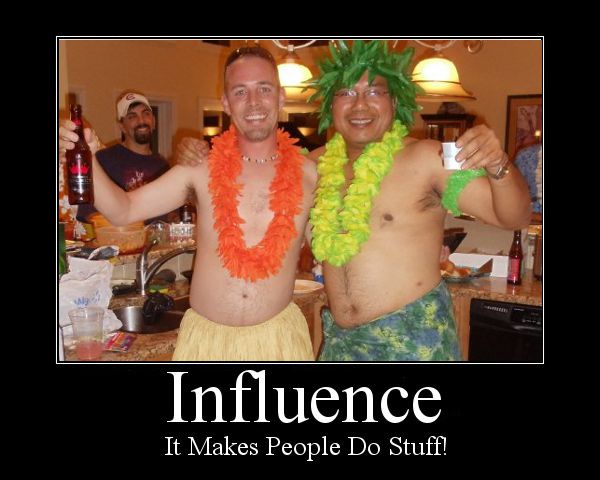
I think it is safe to say that some people are self-conscious when it comes to social media. After all, as an audience builds, it kind of takes on something not so different from public speaking. Many people are terrified of public speaking, and being on a stage where others can pick apart every nuance.
Scarier yet, social media is kind of like public speaking where everything you say is recorded so people can go back later and catch all of your screwups, point them out to others, and make a mockery of you.
Those public perceptions, especially the criticism, can change how you think, how you communicate, and how others will treat you. In fact, I believe that strong peer influences like this can create a profound impact for many people. Sometimes this is good, and sometimes it is bad.
I think it is also safe to say that there is another opposite end of this self-awareness spectrum where people have little or no consciousness at all. They really don’t care what others say, and they take little benefit from criticism or good advice. These are the people begging for you to follow them on Twitter, sending Facebook friend requests to everybody … from a business profile instead of a Facebook Page, and have an urgency to achieve over 500 connections on LinkedIn because if the profile says “500+” it will make them feel more important. They are the ones using tactics without a strategy, and may never understand the greater value of social media.
They don’t let criticism from others affect their actions, and they think it is all done in the name of marketing … which really irritates me. These are the people who will send you automated messages promoting their website that you have absolutely no interest in, and use their favorite keywords instead of a real name when they comment on your blog. It is almost creepy to even glorify it with a mention, but it has become a huge part of our online world.
Does Bad Influence Become More Acceptable En Masse?
We should question whether bad influence becomes more acceptable in large groups, or if it is just more tolerated. What we should be really clear about, though, is that it does not become more effective or useful.
Spam and other ineffective thinking is here to stay. As society has adopted social media as a preferred communication medium, we have each encountered even more spammers and atrocious thinkers than before. As social media begins to reflect an even more accurate cross-section of our world as a whole, the smaller thinkers and late thinkers come in greater abundance. A few will develop excellence, while the majority will try to slide by on the least possible effort. This is very well defined and quantified in the long-standing Pareto Principle, also known as the 80/20 rule.
This tends to affect us all, as we become more skeptical and we scrutinize things just a bit closer. Otherwise, in many cases, people just begin to believe whatever the masses (that 80 percent) tell them as they give up any “common sense” filter. After all, if the masses are saying that you need more Twitter followers, and you don’t already know any better … you must need more Twitter followers, right? It created a Twitter follower frenzy, and a similar frenzy is in place across other networks. It is absurd, but it is a strong reflection of where these people receive their influence.
As my father would sometimes question, “If everybody was jumping off a cliff without a parachute, would you jump, too?”
People Adapt to Their Surroundings
There is a whole lot of truth to judging people by the company they keep. I don’t care how hard you argue against this, it is a fact of life. If you spend enough time around people with a regional accent, you will likely develop an accent over time. If you consume bad information from small thinking people, you will begin to adapt to that, as well. People don’t even need to know the company you keep, because it is written all over you.

I hesitate to imagine that the bad influences of social media are actually more influential than the more beneficial influences. However, what I can say for certain is that they are in much greater abundance, and can create a whole lot of noise.
The more tragic part yet is when the ones making the noise are the same ones I mentioned earlier that do not learn from criticism or good advice, because they don’t even hear it. It becomes a case of the blind leading the blind, and even helping to take away others’ vision.
Avoid Becoming a Schmuck!
Yes, I could rant on this kind of thing, but the question at hand is whether you give enough self-analysis to your online communications efforts. I think it is something valuable to consider, because it is what sets the tone of who you are, either as a person, or as a company.
Watching where you pick up your influence, and asking others’ opinions can be important to helping you avoid schmuckdom … or is it schmucknaciousness? It can also help you to avoid influencing others in a bad direction.
I was reminded of it today as I went through a list of new people following me on Twitter. I found myself making fast judgments about them, to decide if I should follow them back and get to know them. It all got me to wondering how I might look, on the surface, and before people get to know me. I was giving myself a cursory audit of sorts.
We often only have a brief moment to make an impression. I think it is important to be aware of those things we do which can tarnish that moment. It should not be so surprising that a lot of it can come from who we listen to and interact with.
I hope I have encouraged you to step back for a self-analysis. Try to imagine how others see you, and how much it is influenced by others. You may find that you are not making the best connections, or that you are accidentally imitating some of the wrong elements.
What do you think? Do you notice how the people around you affect how you think, and how you communicate?

Podcast: Play in new window | Download